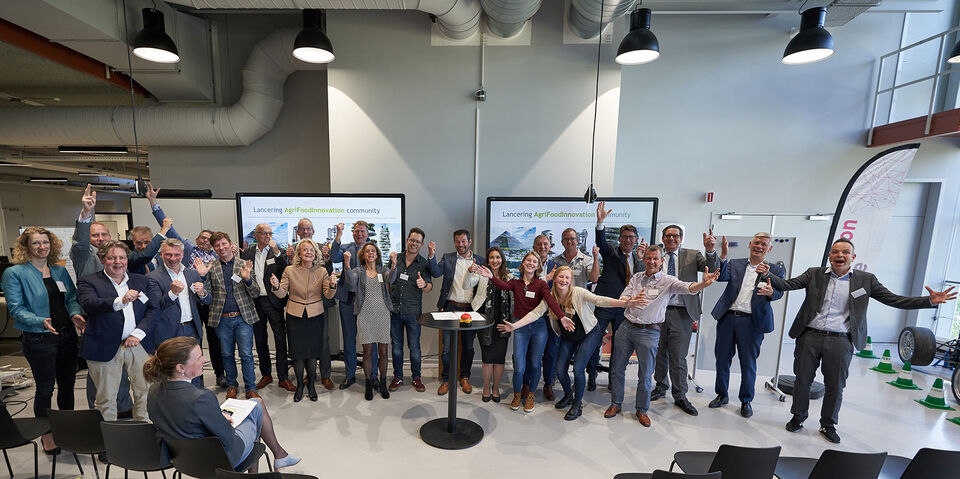WUR rector Mol: “Speed up this process, score that goal”
The speakers and well-intended collaboration plans followed in rapid succession during the kick-off of the AgriFood initiative at TU/e innovation Space yesterday. TU/e, Wageningen University & Research (WUR), HAS University of Applied Sciences, and the Southern Agriculture and Horticulture Organization (ZLTO) want the province of Northeast-Brabant to make the transition to a much more sustainable food production. “The time for talk is over, after a year and a half of preparation, it’s time to take action,” rector Arthur Mol of Wageningen University warned.
Mol spoke his cautionary words during the panel discussion at the end of the meeting. The rector of Wageningen University & Research says the world has taken giants strides towards developments and investments in this field. “We are not moving fast enough, especially when you look at what is going on right now in China and the US. After a year and a half of talking about starting this initiative, the time has come to take action, score that goal.”
WUR has been looking for a partnership with other universities for some time, and found an important partner in TU/e a few years ago. Other knowledge institutions, government agencies, interest groups, and business companies joined the AgriFood Innovation initiative, which officially kicked off during a meeting at the TU/e campus yesterday. The initiative has to result in a multitude of projects, for instance in the field of precision agriculture, 3D-food printing, and plasma technology in agriculture. But, many of the parties involved say, this is only the beginning.
Moonshots
The starting point: food production needs to be made more sustainable, raw materials need to be used more efficiently, food waste needs to be limited, and the sector’s climate impact needs to be drastically reduced. The AgriFood initiative intends to make the sector future-proof by bringing together agrifood, high-tech, and knowledge of data science. Yesterday, three so-called moonshots were presented. One in the field of the development of smart pork supply chains, the second is aimed at the valorization of biomass sidestreams, and the third at digital crop chains.
A broad range of speakers stepped forward in TU/e innovation Space to underline and illustrate the ambitions. Elies Lemkes, quartermaster of the event and Senior Lecturer in Sustainable Production at HAS University of Applied Sciences, talked about building a completely new ecosystem and venture capital’s role in the formation of such a system. She also emphasized the economic importance. “Several crossovers in these sectors are admirable, but it also needs to make money of course.”
The province of Northeast-Brabant, a major investor in this initiative, was represented by deputies Anne-Marie Spierings (Agricultural Development, D66) and Bert Pauli (Economy & Innovation, VVD). Pauli said he was pleased that this initiative is no longer about products, but about setting up controlled processes and systems.
Sexy
TU/e full professor Jakob de Vlieg, who has devoted himself to the partnership with WUR, says that these two institutions have much to offer each other, not just in the field of their research, but also as far as education and development of talent in the field of agritech is concerned. “We should have student teams in this research field as well, like the Solar Team Eindhoven we had at TU/e several years ago.” His WUR counterpart, managing director of the Plant Sciences Group, noted that bringing together technology and the agricultural sector has made the latter “sexy.” He, too, believes that collaboration is crucial. “We need to learn how to communicate openly and in the same language. There is no time to reinvent the wheel individually.”
A few practical examples were touched upon as well; one of customized food production, known as pixelfarming, and one of the valorization of agricultural side streams by the company vanRijsingengreen.
TU/e students Saskia van Hoeven (Industrial Design) and Melissa Baars (Innovation Sciences) informed the attendees about their drone project for Nepal with which they try to help farmers gain better insight into the soil conditions of their fields. Immediately after the students finished their presentation, several people in the audience indicated that they would like to help them with that.



Discussion